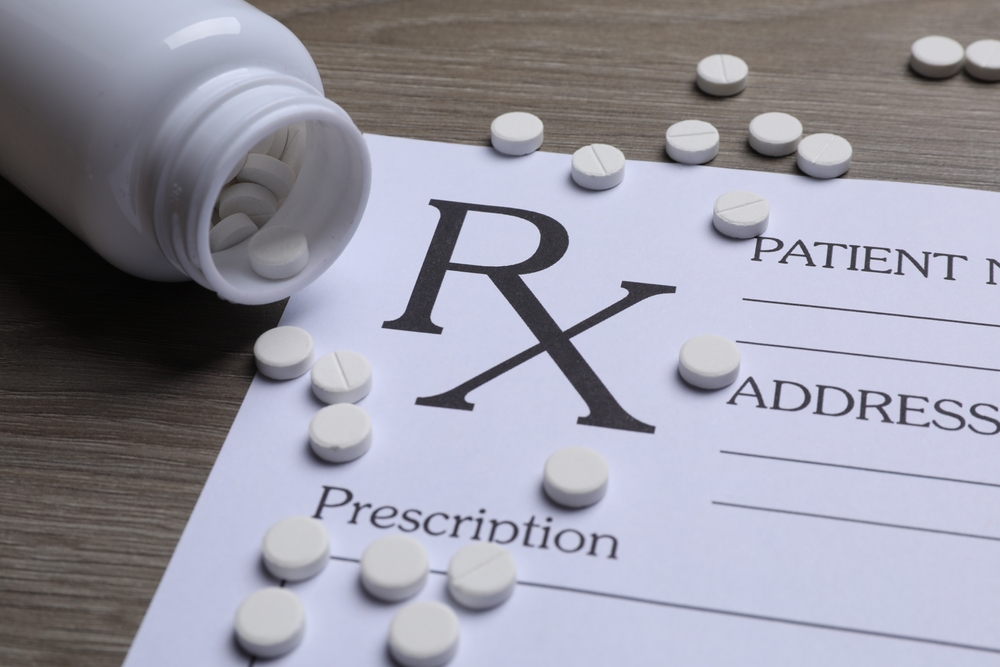Last Updated:
September 18th, 2025

Prescription drugs can be life-changing, but some come with hidden risks. What starts as treatment can, over time, turn into something harder to walk away from. We look at the most addictive types of prescription medication, how they affect the body and the warning signs to watch for.
What are prescription drugs?
Prescription drugs play a vital role in today’s world. For many, they’re the difference between functioning and falling apart, offering relief from pain, stabilising moods, regulating sleep or helping the body heal after surgery or illness.
But these aren’t medicines you can pick up over the counter. They’re specifically prescribed by a medical professional, based on an individual’s health needs and often tailored in strength and dosage to suit the condition being treated.
You’ve likely heard of some of the most common ones:
- Codeine or morphine might be given for moderate to severe pain
- Diazepam is often prescribed to manage anxiety or muscle spasms.
- Zopiclone helps people who can’t sleep
- Fluoxetine supports those living with depression.
Each has its place and purpose; when used correctly, they can truly change lives.
But as helpful as prescription drugs are, some come with a side that isn’t always easy to see at first. For certain medications, especially those used over a long period or at high doses, the body and mind can start to rely on them. In these cases, the drug that once helped can begin to cause harm.
Are all prescription drugs addictive?
Not all prescription drugs are addictive. Many medications pose little to no risk of addiction, especially when taken as directed. Antibiotics, for example, fight infections and don’t trigger cravings or physical dependence. Blood pressure medications, contraceptive pills or asthma inhalers are other examples of non-addictive prescriptions that serve essential medical purposes without interfering with the brain’s reward system.
Addictive prescription drugs tend to be those that affect the brain’s chemistry, especially those that relieve pain, reduce anxiety or help with sleep. Over time, the body can grow used to their presence, making it harder to function without them.
So while addiction is a concern with some prescription drugs, it’s far from a risk with all. The key is understanding which ones carry that potential and using them with care.
The most addictive prescription drugs
In this section, we take a closer look at three types of prescription drugs known for being highly addictive.
Note: Listing these prescription drugs is not intended to discourage you from taking medication that’s been prescribed. This guide is for educational purposes only and you should always follow your doctor’s advice.
Opioids
Opioids are strong painkillers usually given after surgery, injury or to manage chronic pain. They reduce the intensity of pain signals sent to the brain and in doing so, also create a sense of deep relaxation or euphoria.
Some of the most addictive opioids include:
- OxyContin (oxycodone)
- Vicodin (hydrocodone)
- Morphine
- Fentanyl
Benzodiazepines
Benzodiazepines or benzos, are commonly used to treat anxiety, panic attacks and sometimes even insomnia. They slow down brain activity, creating a sense of calm and quiet. For people in distress, that feeling can be a lifeline.
Some of the most addictive benzos include:
- Xanax (alprazolam)
- Valium (diazepam)
- Ativan (lorazepam)
- Klonopin (clonazepam)
The fear of going through these symptoms often keeps people from using longer than they want to.
Sleeping pills
Sleeping pills are used to help people fall asleep or stay asleep. Some are classed as benzodiazepines but many of the newer ones are known as Z-drugs because of names like Zopiclone or Zolpidem. They’re usually prescribed for short-term insomnia.
Some of the most addictive sleeping pills include:
- Zopiclone
- Zolpidem (Ambien)
- Temazepam
- Eszopiclone (Lunesta)
Each of these drug categories has a different purpose, but they all share something in common: the way they can slowly take control of the body and mind. No one plans to become dependent, and if you’re finding it hard to stop taking any of these medications, even if you’re following the prescription, it could be time to reach out for support.
How do I know if I have a problem with prescription medication?
When a doctor prescribes a drug, it’s easy to trust it completely—most people do. The logic feels sound: it must be safe if it came from a professional. In many cases, that’s true, but without the right guidance or regular check-ins, it becomes easier than you’d think to lose track of how that medication is affecting you.
That’s why checking in with yourself is important, even if you feel everything is under control.
Here are a few questions to ask yourself but note that this is just a general guide. Signs can vary depending on the type of drug you’re taking.
- Do you feel anxious or physically unwell when you skip a dose?
- Have you increased your dosage without speaking to your doctor first?
- Do you feel like the medication isn’t helping as much as it used to but you keep taking it anyway?
- Have you caught yourself hiding how much you’re taking from people around you?
- Do you feel nervous or unsure about how you’d cope without it, even if your original symptoms have improved?
If any of those questions resonate with you, you should seek further advice from a medical professional.
What are the next steps?
If you’re worried that you or someone you care about has developed a dependency on prescription medication, now is the time to reach out. At UKAT, we’ve helped thousands reclaim control and find freedom from addiction. Whether it started with pain relief, anxiety support or sleep issues, there is a way forward. Our team is here to guide you through it.
Get in touch today and take the first step toward lasting recovery.





